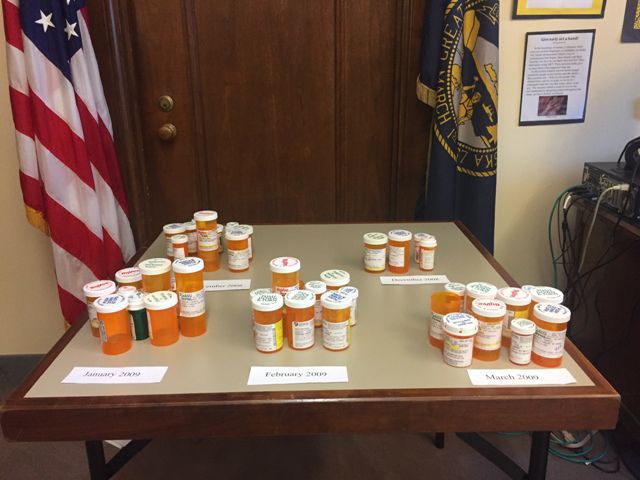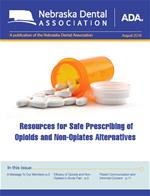 Senator Sara Howard
Senator Sara Howard introduced
Legislative Bill 931, which would set a seven-day limit on opioid prescriptions for minors, with some exceptions. She has a personal interest in the issue . . . her sister
Carrie (right side in the photo) overdosed on Oxycotin in March 2009. (
Photo credit WOWT)

Between December 2008 and March 2009, Senator Howard's sister Carrie was prescribed
over 4,500 pills. They were prescribed to her after a car accident. The photo above is from Senator Howard's press conference. After Carrie’s death, her family discovered several prescription pill bottles; all from different doctors, and different pharmacies. Carrie had been “doctor shopping.” She knew exactly who to go to, and where to get these drugs filled without ever raising questions among her doctors or pharmacists.
LB 931 was complete replaced by the Judiciary Committee's amendment,
AM 1849 on February 26, 2018. Two addition amendments have been filed and LB 931 is now on Select File, the final stage before Final Reading and on to the Governor for signing.
LB 931 passed 48-0-12 on March 29th. The new law is below. Text in
italics is NDA commentary.

The NDA published
Resources for Safe Prescribing of Opioids and Non-Opiates Alternatives in response to the passage of these new laws.
Patient Communication
The best way to understand the importance of your patients’ experience in your practice is to put yourself in their shoes. No one likes pain and if they will be facing a procedure that involves a few days of acute pain, more communication is always better.
Sec. 3.
(1) When prescribing a controlled substance listed in Schedule II of section 28-405 or any other opiate not listed in Schedule II, prior to issuing the practitioner’s initial prescription for a course of treatment for acute or chronic pain and again prior to the practitioner’s third prescription for such course of treatment, a practitioner shall discuss with the patient, or the patient’s parent or guardian if the patient is younger than eighteen years of age and is not emancipated:
(a) The risks of addiction and overdose associated with the controlled substance or opiate being prescribed, including, but not limited to:
(i) Controlled substances and opiates are highly addictive even when taken as prescribed;
(ii) There is a risk of developing a physical or psychological dependence on the controlled substance or opiate; and
(iii) Taking more controlled substances or opiates than prescribed, or mixing sedatives, benzodiazepines, or alcohol with controlled substances or opiates, can result in fatal respiratory depression;
(b) The reasons why the prescription is necessary; and
(c) Alternative treatments that may be available.
(2) This section terminates on January 1, 2029.
Accute Pain Protocol
Section 4 below aligns with the research reported by the ADA: In most cases, acute pain can be treated effectively with nonopiate or nonpharmacological options. If opiates are indicated, short term scripts are now state law.
Sec. 4.
(1) The Legislature finds that:
(a) In most cases, acute pain can be treated effectively with nonopiate or nonpharmacological options;
(b) With a more severe or acute injury, short-term use of opiates may be appropriate;
(c) Initial opiate prescriptions for children should not exceed seven days for most situations, and two or three days of opiates will often be sufficient;
(d) If a patient needs medication beyond three days, the prescriber should reevaluate the patient prior to issuing another prescription for opiates; and
(e) Physical dependence on opiates can occur within only a few weeks of continuous use, so great caution needs to be exercised during this critical recovery period.
(2) A practitioner who is prescribing an opiate for a patient younger than eighteen years of age for outpatient use for an acute condition shall not prescribe more than a seven-day supply except as otherwise provided in subsection (3) of this section and, if the practitioner has not previously prescribed an opiate for such patient, shall discuss with a parent or guardian of such patient, or with the patient if the patient is an emancipated minor, the risks associated with use of opiates and the reasons why the prescription is necessary.
(3) If, in the professional medical judgment of the practitioner, more than a seven-day supply of an opiate is required to treat such patient’s medical condition or is necessary for the treatment of pain associated with a cancer diagnosis or for palliative care, the practitioner may issue a prescription for the quantity needed to treat such patient’s medical condition or pain. The practitioner shall document the medical condition triggering the prescription of more than a seven day supply of an opiate in the patient’s medical record and shall indicate that a nonopiate alternative was not appropriate to address the medical condition.
(4) This section does not apply to controlled substances prescribed pursuant to section 28-412.
(5) This section terminates on January 1, 2029.
Picking Up an Opioid Presription Requires a Photo I.D.
Sec. 5. (1) Unless the individual taking receipt of dispensed opiates listed in Schedule II, III, or IV of section 28-405, is personally and positively known to the pharmacist or dispensing 8 practitioner, the individual shall display a valid driver’s or operator’s license, a state identification card, a military identification card, an alien registration card, or a passport as proof of identification.
(2) This section does not apply to a patient who is a resident of a health care facility licensed pursuant to the Health Care Facility Licensure Act.
Continuting Education Requirement
LB 731 amended
38-145 to require 3 hours of CE:
(6) Beginning with the first license renewal period which begins on or after October 1, 2018, the continuing competency requirements for a nurse midwife,
dentist, physician, physician assistant, nurse practitioner, podiatrist, and veterinarian who prescribes controlled substances shall include
at least three hours of continuing education biennially regarding prescribing opiates as defined in
section 28-401. The continuing education may include, but is not limited to, education regarding prescribing and administering opiates, the risks and indicators regarding development of addiction to opiates, and emergency opiate situations.
One-
half hour of the three hours of continuing education shall cover the
prescription drug monitoring program described in sections 71-2454 to 71-2456. This subsection terminates on January 1, 2029.